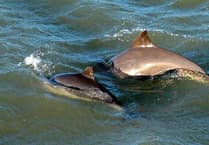Can you answer a short survey that will help in creating a plan to address marine invasives in Wales?
Natural Resources Wales and APEM Environmental Consultancy are working together to create plans for protecting Welsh waters against marine invasive species.
The survey introduction reads: “Invasive Non-Native Species (INNS) are species that have been introduced into an area that they are not naturally found in, either intentionally or accidentally, and have been able to establish themselves (e.g., growing, reproducing and spreading). They are termed 'invasive' because they have a negative impact on the local ecosystem and biodiversity as well as to people and businesses.“
“One example of a marine INNS with negative impacts in the UK is the American slipper limpet (Crepidula fornicata) which was first recorded in the UK in the 1870s.
“This hard-shelled snail is prolific and can form stacks of up to 15 individuals! They compete with native species for space and food and, as populations can reach densities of several thousand per square metre, they can alter the structure of habitats, for example, by covering a previously soft sediment area with their densely packed chains of hard shells. They can also cause economic problems as the slipper limpet can colonise aquaculture equipment and foul the shells of mussels and oysters, impacting the survival and growth of the cultured species and incurring costs to businesses.
“Natural Resources Wales and APEM Environmental Consultancy are working on a project to reduce the risk of marine INNS arriving and spreading in Wales. Accessing local knowledge and engaging users can help us achieve the best outcomes for protecting our marine environment - so we need your help. Please could you read and answer the following questions so we can get an understanding about you, your use of the marine environment and any steps we might be able to take together going forward?”
The survey goes on to ask questions about awareness of marine invasives and their impact, what activities those surveyed take in a marine environment, the frequency of their visits, what actions they take to protect that environment, and whether they would be interested in workshops.





Comments
This article has no comments yet. Be the first to leave a comment.